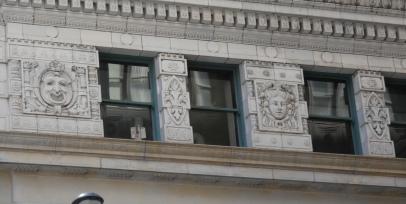
Right on the streets of every American community, robbery takes place every working day. You might not realize how much value the people of Chicago (and every other community) already create, simply by going about our daily activities. You’ll learn how we could comfortably produce much more, if only a smart tax policy were put in place.
Originally conceived as a field trip for Progress and Poverty students, this stroll — about 2 km and 90 minutes — presents some answers for those interested in finding out. Additionally, we’ll take a look at recovered loot of a long-ago theft, learn how Thomas Jefferson proposed to finance Chicago’s public schools, see some infrastructure that you probably didn’t know about, visit a shopping mall that you paid for but don’t own, and glimpse a billionaire’s downtown garden.
Detailed sourced notes will be provided. This is now a free tour, no donation required, although we do appreciate (tax-deductible) contributions from those who can afford it and find the event worthwhile.
Please sign up using the Eventbrite link.
Event description at the registration link
Event description at the registration link
Please register for this Zoom Webinar by clicking the green registration button.
David Wilson, author of the forthcoming book Towns Along the Q, will discuss the consequences of certain disastrous and discriminatory housing policies that he has become familiar with in the course of researching the topic, development of Chicago’s western suburbs along the Chicago Burlington & Quincy Railway.

Introducing Progress & Poverty
In less than two hours, you’ll gain new insight into the causes of low wages, worsening inequality, and economic stagnation, and examine a proposal that could create genuine opportunity for everyone willing to work.
After an overview of Henry George’s early life and work, you’ll consider why most current policies and proposals not only fail to solve problems of poverty and inequality, but often worsen them. You’ll then consider Henry George’s straightforward method for raising wages while lowering the actual cost of living, focusing on how it can apply today, even solving some 21st-century problems.
While Introducing Progress & Poverty is complete in itself, it’s also the first session of our Progress & Poverty course, which starts September 6 at our loop location, 333 S. Wabash.
Introducing Progress & Poverty
In less than two hours, you’ll gain new insight into the causes of low wages, worsening inequality, and economic stagnation, and examine a proposal that could create genuine opportunity for everyone willing to work.
ALTHOUGH THIS EVENT IS FREE, YOU MUST PRE-REGISTER BY EMAILING events@hgchicago.org or phoning 312/362-9302, so that building security will be notified to admit you.
After an overview of Henry George’s early life and work, you’ll consider why most current policies and proposals not only fail to solve problems of poverty and inequality, but often worsen them. You’ll then consider Henry George’s straightforward method for raising wages while lowering the actual cost of living, focusing on how it can apply today, even solving some 21st-century problems.
While Introducing Progress & Poverty is complete in itself, it’s also the first session of our Progress & Poverty course, which continues on Thursdays thru November 17.
